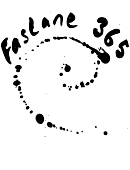 Faslane Naval Base, Scotland, September 4, 2007, 06.30 a.m.
Faslane Naval Base, Scotland, September 4, 2007, 06.30 a.m.
Police say 3 women have been arrested inside the high security fences at the Trident nuclear submarine base after entering the base to get further information on the weapons of mass destruction deployed by the UK government in contravention of Scottish and International Law. According to the police, the women, who were acting to uphold the law, are being charged under the Serious Organised Crime and Police Act, which is increasingly being used to prevent peaceful protests at sensitive sites, including Britain’s nuclear bases.
Lavinia Crossley, Tansy Newman Turner and Emma Bateman, all part of a group calling themselves the ‘Faslane 365 Serious Organised Crime Investigation and Prevention Team’, went into the base to find evidence on the rules of engagement, policies and procedures for the deployment, targeting and use of nuclear weapons and to discover what information is provided to personnel about the legal, safety and security implications of their work on Trident. Their action kicks off the last month of the Faslane 365 year-long blockade, in which almost 1000 people from all over the world have been arrested.
In carrying the nonviolent resistance to the illegal deployment and renewal of Trident into the submarine base itself, the women took this action because they consider that the deployment of Trident constitutes preparation for a war crime. This violation of Scottish and international law is compounded by the UK Government’s policies of deployment, constituting an ever-present threat to use Trident. The women’s action was against both the current deployment and the government’s stated intention to replace the current Trident-carrying Vanguard-class submarines with new ballistic missile submarines, in breach of the Nuclear Non-Proliferation Treaty (NPT), of which Britain is a Party.
“Nuclear weapons are immoral and illegal,” said Lavinia Crossley (22) from Bradford. “I feel I have to act because if I do not, who will? The Government continues to cover up the illegality of these weapons and instead pretend that we are the criminals.”
Emma Bateman (40), from Leicester, said, “It is ridiculous to threaten Iran with sanctions for possibly wanting nuclear weapons when we have actual WMD here and ready to be used.”
Tansy Newman Turner (21), also from Leicester, said, “Nuclear weapons are not much use against terrorism and this legislation is an admission that Faslane is a target for terrorists, thus putting us in more danger. Nuclear weapons pose a threat and danger to us, not a protection or deterrent.”
The “Faslane 365 Blockade” started on October 1, 2006. Thousands have participated and more than 930 people have been arrested. On October 1st there will be a celebratory “Big Blockade’ involving all the blockading groups that have participated throughout the year.
See www.faslane365.org for photographs and further information.
>>>>>>>>>>>>>>>>>>>>>>>>>>>
At 11.00a.m. today, 3 more peace protesters breached security at the North gate of the Faslane nuclear submarine base, entering on bicycles. This second team from the ‘Faslane 365 Serious Organised Crime Investigation and Prevention Team’ follows the earlier arrest of 3 women inside the base. It is understood that they are being charged under the Serious Organised Crime and Police Act (SOCPA). The total number of Scottish SOCRAP arrests is now 6.
Like the 3 earlier Faslane 365 activists, arrested at around 4.30 a.m. this morning after climbing the high security fences, Janet Fenton, Angie Zelter and Wolf Konowski entered the Faslane base to find evidence on the rules of engagement, policies and procedures for the deployment, targeting and use of nuclear weapons and to discover what information is provided to personnel about the legal, safety and security implications of their work on Trident.
Janet Fenton (60) from Edinburgh said, “The Serious Organised Crime and Police Act does not have backing in Scotland. It is there to stop people exposing the real law-breaking of the UK Government. The deployment of Trident is illegal according to the World Court.”
Angie Zelter (56) from Norfolk said, “The law must not be used to protect illegalities. SOCAP is political legislation that makes it a criminal offence for protesters to go into Faslane when it is our legal, civil and moral duty to uphold the law by exposing and preventing preparations for mass murder.”
Wolf Konowski (43) from Germany, added, “For evil to triumph it is only necessary for good people to do nothing.”
Note for editors:
The “Faslane 365 Blockade” started on October 1, 2006. Thousands have participated and more than 930 people have been arrested. On October 1st there will be a celebratory “Big Blockade’ involving all the blockading groups that have participated throughout the year.
The Serious Organised Crime and Police Act (SOCAP) became law in 2005, and amended by the Terrorism Act 2006. Under the rubric of defending against terrorism, SOCAP makes it a criminal offence to “trespass” on certain areas of land, including military facilities, such as the Trident nuclear weapons base at Faslane
The United Kingdom currently deploys up to 200 nuclear warheads on US Trident missiles, carried on nuclear submarines based at the Faslane Naval Base in Scotland. The majority of warheads are 100 kilotonnes, which is more than 8 times bigger than the bombs used on Hiroshima and Nagasaki in 1945. The UK is facing a highly controversial decision on whether to get the next generation of Trident nuclear weapons or move towards genuine nuclear disarmament, as required under the 1970 Nuclear Non-Proliferation Treaty and subsequent international agreements, as specified by the International Court of Justice in 1996. Recent opinion polls show that 80 percent of people living in Scotland (and 55 percent in the UK as a whole) are opposed to nuclear weapons and want Trident to be cancelled. On June 14, the Scottish Parliament voted against Trident by 71 votes to 16 (with 39 abstentions).
See www.faslane365.org for photographs and further information.
CONTACT Rebecca Johnson: 077333 60955
www.faslane365.org
